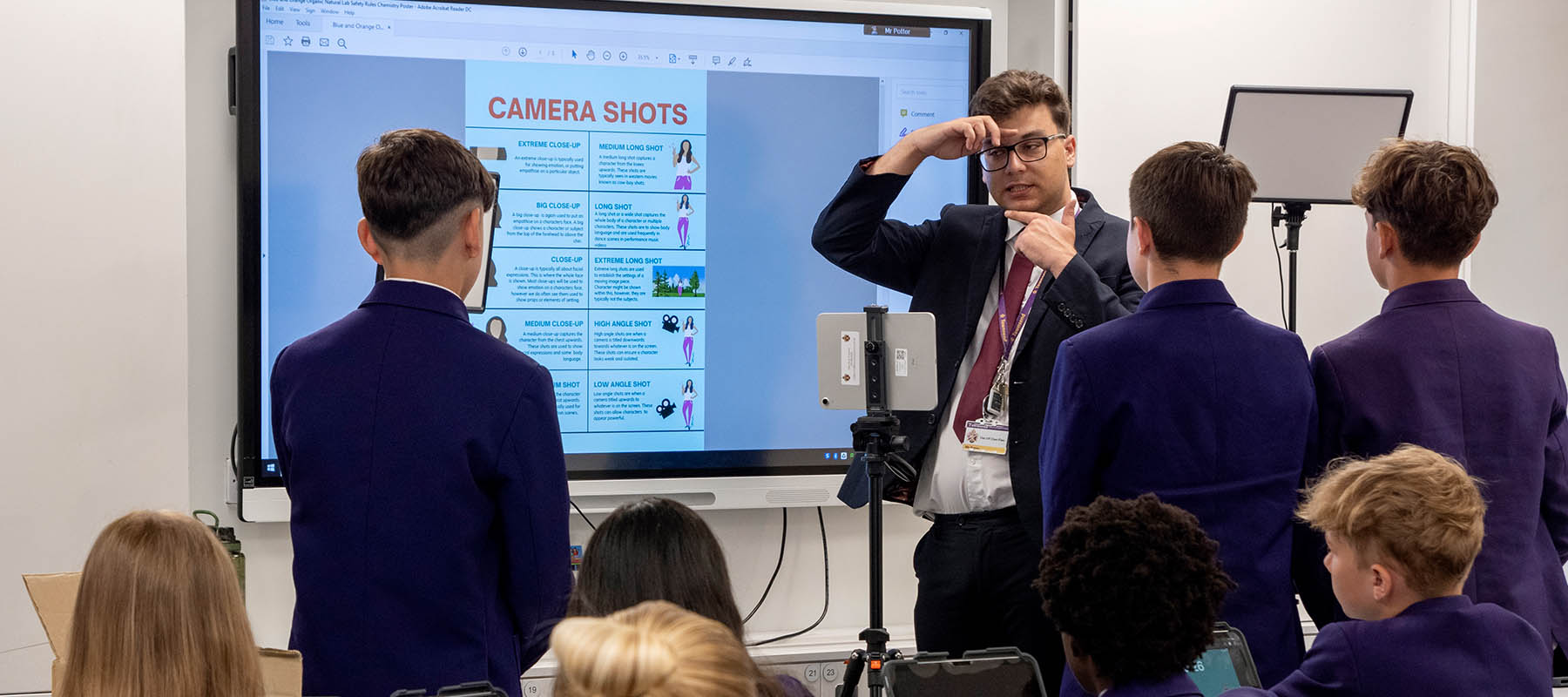Film Studies
Film captivates many through its immersive audio-visual power, evoking emotional and reflective responses. Students of film often bring deep passion, inspired by its storytelling, characters, and impactful themes. As a dominant art form of the past century, film significantly influences thought and feeling, making its study both relevant and vital.
Course Details
Eduqas GCSE Film Studies- https://www.eduqas.co.uk/qualifications/film-studies-gcse/#tab_keydocuments
Course Description
This engaging course explores the power of film as a cultural and artistic medium. Students study a diverse range of films from Hollywood classics to global cinema, gaining historical, social, and technological insights. They examine how film form: cinematography, mise-en-scène, editing, and sound, creates meaning and generates responses. Learners compare US films across decades, analyse global narratives and representations, and explore aesthetic qualities in UK film. Creative production is also central; students apply their knowledge through filmmaking or screenwriting. This course fosters both critical understanding and practical skills, inspiring learners to view, analyse, and create film from an informed and imaginative perspective.
Component 1:
Key Developments in US Film – 35%
Students study one pair of genre-based mainstream US films, one made between 1930–1960 and the other from 1961–1990. These will focus on narrative, genre, and social, historical, and political contexts. They also study one recent US independent film, with an emphasis on specialist film writing. All films are explored using the core study areas: cinematography, mise-en-scène, editing, and sound. The exam includes questions on film comparison, historical and technological developments in film, and extended analysis of the independent film.
Component 2:
Global Film – Narrative, Representation and Film Style – 35%
Students study three non-US films: one global English-language film (focusing on narrative), one global non-English-language film (focusing on representation), and one contemporary UK film (focusing on aesthetic qualities). All films are analysed through core study areas such as cinematography, mise-en-scène, editing, sound, and various social and historical contexts.
Component 3:
Production
As part of the course, students create an individual film production: either a short filmed extract (2–2½ minutes) or a screenplay (800–1000 words) with a shooting script. This practical work is supported by a written evaluative analysis comparing their work to professional examples. Students apply their understanding of film genre, style, and narrative from earlier in the course. Students will also be completing practical projects throughout the year.
Assessment
Component 1
- 1 hour 30 minute written exam
- 35% of the qualification
- 70 Marks (stepped questions)
Component 2
- 1 hour 30 minute written exam
- 35% of the qualification
- 70 Marks (stepped questions)
Component 3
- 12-14 weeks NEA
- 30% of the Qualification
- 60 Marks
- Home learning
Students can expect a variety of engaging homework tasks that support their learning both practically and theoretically. Typical homework may include:
- Film Analysis Tasks – Writing short essays or notes on key scenes, focusing on cinematography, editing, sound, and mise-en-scène.
- Research Projects – Investigating film contexts (e.g. historical, cultural, or social backgrounds of set films).
- Storyboarding or Scriptwriting – Planning film scenes or developing screenwriting skills.
- Revising Key Terminology – Learning and applying film language for exams.
- Watching Set Films – Viewing or re-watching films at home to deepen understanding.
All tasks aim to develop analytical thinking and creative skills.
Where can Film take you
Further Education:
Doing a GCSE in Film Studies opens up a range of exciting pathways for further study at A-Level or university.
You could study:
- A-Level Film Studies
- Media Studies
- Drama and Theatre
- Creative Writing or Screenwriting
- Photography or Visual Arts
- Communication or Cultural Studies
- Film Production or Film Theory degrees at university
- English Literature and English Language
GCSE Film Studies provides a strong foundation for creative and media-focused courses.
Careers
- Media & Communications (TV, radio, digital content)
- Journalism & Publishing
- Marketing & Advertising
- Public Relations
- Teaching & Education
- Event Management
- Creative Writing & Scriptwriting
- Graphic Design & Visual Arts
- Law (especially media or entertainment law)
- Business & Management
- Technology (like video game design or app development)
How can parents support their child’s learning?
- Encourage regular viewing and discussion of a variety of films and genres.
- Support them in practicing key skills like analysis and writing about films.
- Encourage use of additional resources like books, documentaries, and online tutorials.
Useful links
- Exam Board – eduqas.co.uk
- BBC Bitesize – bbc.co.uk/bitesize
- Seneca Learning – senecalearning.co.uk
- British Film Institute – https://www.bfi.org.uk/


